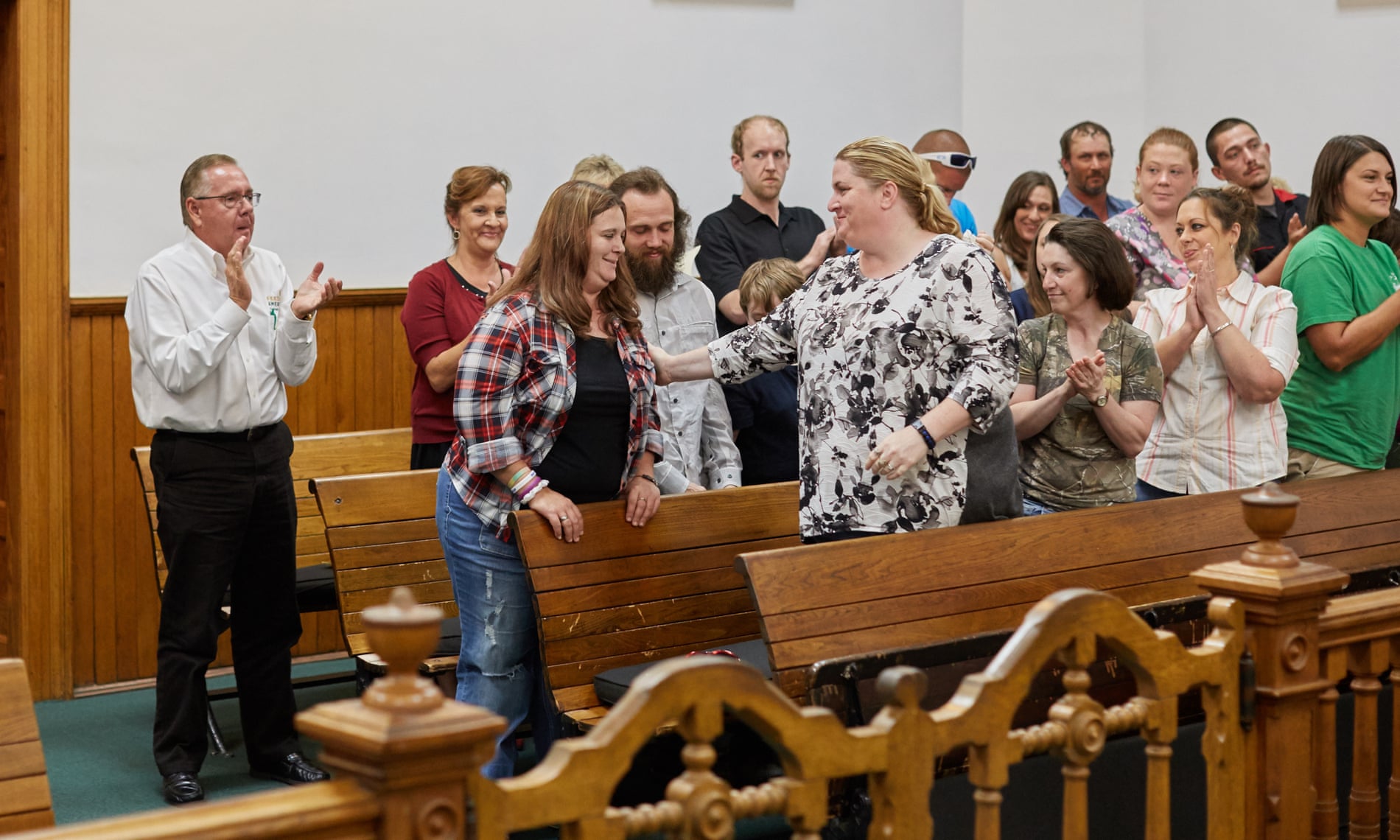
“Opioid and methamphetamine abuse tore through this area like a wildfire.”
This is the view of Rebecca Holmes, who is responsible for mental health and drug use outpatient treatment in Abingdon, Washington County, Virginia, as she looks back at the decision to set up a drug court.
Holmes, the medical director of Highlands Community Services, had seen how the growing crisis around opioids had taken such a heavy toll on families in the town, which is home to just over 8,000 people.

- Early morning, Abingdon.
There was a growing need for a small group of addicts that did not respond to treatment or programs offered by the existing court or probation, she said, so five years ago she applied for a grant to use a federal model for a drug court that had first emerged in 1989.
The county’s drug court has been in place for several years now and Holmes feels that it has never been more needed. Last year in Virginia there were more deaths from heroin and opioids than highway fatalities for the first time, and the governor declared a public health emergency.
Nationally, opioids are said to be killing 90 people a day.


- The Washington County court house, left. Inside the county court room where the drug court meets every week.
Judge Lowe presides over the court and the program, which is a year and half long for those who are placed on it. It combines therapy with a structured program of court visits, random drug screens, curfews and full-time employment for participants.
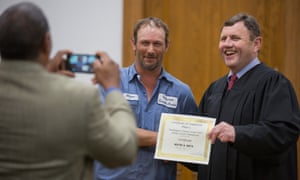
- Judge Lowe poses with Wayne Smith, who has completed the second phase of the four-phase drug court. Participants are rewarded for good behavior.
There is the ever-present threat of court sanctions if a participant relapses. Lowe says: “The point of drug court is not just to treat the addict, it’s to make that person a model for the rest of their family so that they can break the cycle of drug abuse.”
The Guardian visited last year and again this year in late summer to see how people who had gone through the court – and who worked there – were getting on.
Bubba

- Bubba and Ginger in their bedroom.
Bubba Rouse started abusing painkillers when he was a young teenager. He then stole various pills he could get his hands on. At 17 Bubba started smoking meth. He also became a father for the first time.
Bubba continued to use drugs and found a new girlfriend, Ginger, whose father had been sent to prison for meth when she was eight years old. Bubba and Ginger were both using meth and heroin when Ginger got pregnant. “The reason I stopped using was because I knew I had a future coming with my baby and I didn’t want to bring a child into a world like the one I grew up in.”
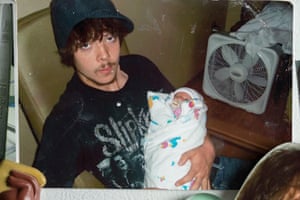
- Family pictures of the Rouse family are displayed throughout the home where Bubba Rouse grew up.

- Playing with her Barbie dolls.
Ginger was able to get sober and her baby was born without any complications while Bubba was in prison. While in prison he was offered a place in the Washington County drug court program. Drug court can be very difficult, especially at the beginning. There are mandatory therapy meetings, frequent random drug screens, curfew calls in the middle of the night and you have to have to be employed full time. It was even more difficult for Bubba because he could not legally drive. Ginger became both chauffeur and workmate for Bubba this past year.
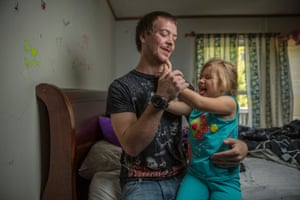
- Bubba with his daughter.
They have managed to work together in a factory, on a construction crew and now at a fast-food restaurant. Bubba and Ginger moved in with Bubba’s parents where Bubba was able to able to get closer to his oldest daughter. For most of the year his younger daughter, with Ginger, was taken care of by Ginger’s mother.

The family is now reunited and Bubba and Ginger have taken over the payments on a double wide trailer that they hope to move next to Bubba’s parents home. After drug court graduation in six months, Bubba hopes to start working construction with Ginger’s stepfather.
Bubba said: “Drug court has been good for me but there are not many programs in this area and I wish there were more things to help people quit early rather than when things get really bad.”
Chris Brown

- Maria Kestner is hugged by Chis Brown at her drug court graduation ceremony.
Chris Brown is a retired police officer with nearly 30 years on the job. “As a police officer you get jaded after a while. You go to the same addresses and visit the same families all the time. It hit me when I started arresting the grandchildren of people I arrested when I was a rookie cop. You realize early on that you can’t incarcerate your way out of this drug problem.”
After retiring from the police force, Chris was looking for a job where he could help people. “When the job of drug court coordinator became available, I jumped at the chance.
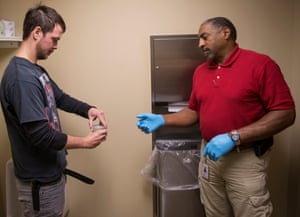
- Bubba hands a drug test cup filled with his urine to Chris Brown.
“This is a wonderful way to help people. I found my humanity with this job.” Chris takes his job very seriously. He’s on call 24/7. He handles compliance with spot drug screens, curfew calls as well as issues of transportation, housing and dealing with family issues of those in the program.
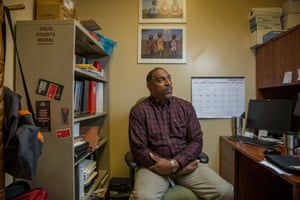
You realize early on that you can’t incarcerate your way out of this drug problem
He is not judgmental and he is a good listener. “I remember talking with a drug addict years ago and asking him how he wanted to be treated. He told me he just wanted to be treated like a human being. That’s what I try to do with everyone in the program: treat them like human beings rather than drug addicts.”
Joyce Yarber
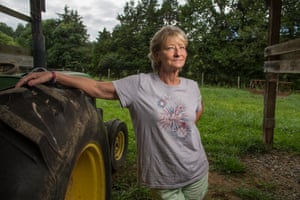
- Joyce Yarber manages a cattle ranch and hay farm with her husband.
Joyce Yarber, age 59, has always walked with a limp. She has suffered with hip dysplasia and osteoarthritis for most of her life. For over 20 years, her doctor had prescribed a painkilling cocktail that included Lortab, Percocet and oxycodone. When her doctor was arrested for over prescribing opiates she became desperate and eventually wrote half a dozen prescriptions for herself. She was arrested and offered drug court. Because she had written scripts in both Virginia and Tennessee, it took two years of legal wrangling before she could start the drug court program in Washington County, Virginia.
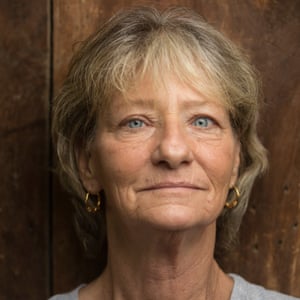
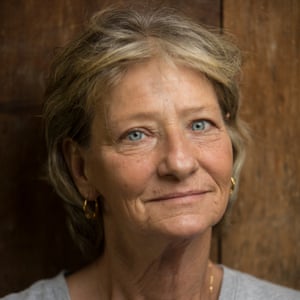
Before starting drug court, she was required to get a hip replacement operation, the hope being that the operation would eliminate the pain that caused her to become a drug addict. Determined to stay sober, Joyce refused to take any opiates after the operation. Her only post-operation painkiller was an over-the-counter one. That determination impressed the drug court team. “When I first started drug court, I was a drug snob. I thought that because I got my drugs from a doctor rather than buying them on the street, I was somehow better. It didn’t take long for me to realize I was wrong. I was no better than anyone else in the program. I was just as much an addict as they all were.”
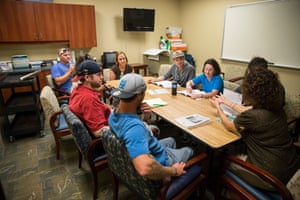
- The start of a therapy session at Highlands Community Services for drug court participants.
Joyce has been a model client in drug court and because of her age and her outgoing personality, she has become a mother figure for the group. The only time she missed a therapy meeting was when she was trapped in a tree without her cellphone by a young bull on the cattle farm that she and her husband operate. That bull was culled from the herd the next day.
I thought that because I got my drugs from a doctor rather than buying them on the street, I was somehow better. It didn’t take long for me to realize I was wrong
A few months into the drug court program, Joyce went to her doctor and was diagnosed with stage four lung cancer. Because the pain caused by the cancer was so great, she knew that she would have to go back on to opiate pain medication just to get through her chemotherapy. She offered to resign from the program but the team insisted that she stay. Her medication level is monitored by the drug court and she still attends all of the meetings. “I got a call from the probation office in Tennessee and they gave me a date that I need to call them by after I complete drug court. I sure hope I’m around and that I can remember to call. This chemo brain is a real pain.”
Zac Holt

Zac Holt was always a gifted athlete. His goal after graduating from college was to attend seminary and become a Presbyterian minister. Those plans were delayed after Zac fell 45ft while free climbing. He broke a leg and fractured a vertebra. While in hospital, he was given narcotic pain medication. Zac had experimented with marijuana and cocaine in high school and college but drugs were never a major part of his life.


- Zac trains daily and has competed in two triathlons since beginning drug court
That changed after he was exposed to percocet and oxycodone. After he was released from the hospital, he began doctor shopping and getting multiple prescriptions. He went off to seminary and continued using drugs. “I became a raging drug addict. I would do anything for my drugs. I lied, cheated and stole, mostly from my family. I dropped out of school. I went through therapy several times but always came back to my drugs.” Zac’s drug use went on for nine years.

- Zac Holt was addicted to opioids for nearly nine years.
When he was arrested for possession and put on probation he continued to use drugs. He confessed this to his probation officer who then sent him to jail. While in jail his jaw was broken in a lunch room fight. He had reached bottom when he was offered drug court earlier this year. “Drug court was the best thing in the world for me. I wanted to change my life and drug court gave me a way to change.” Zac embraced the discipline and structure of drug court. He went back to live with his parents and started reconnecting with his family. He also started training for a triathlon. It seemed like an impossible goal for someone who had never competed in one. The regimen of drug court and constant training fills every waking moment. Zac has 10 more months of drug court before graduating. He is active in his church and is contemplating a return to seminary. He has also completed two triathlons.

- Zac is thinking about returning to seminary and becoming a Presbyterian minister after he completes drug court.
Drug use in south-western Virginia shows no sign of decline. Use of Suboxone is on the rise and meth is still entrenched in the hills of Appalachia. Brown, the drug coordinator for the Washington County drug court said: “You can’t let yourself get discouraged by the numbers. You just work and fight drug addiction one family at a time.”